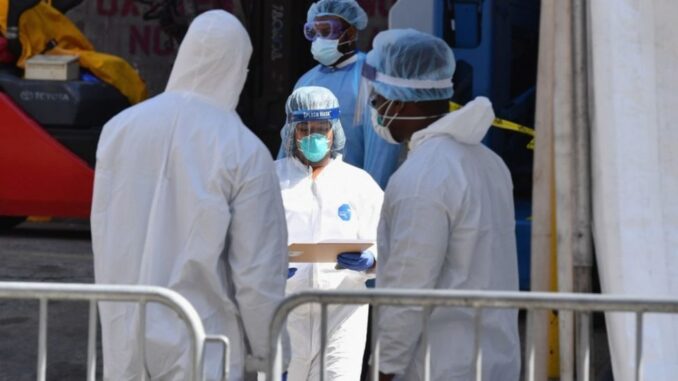
Many reports that African Americans have died disproportionately from COVID-19 have correctly attributed this phenomenon to structural socio-economic inequalities, but failed to provide a historical account of the root causes of these disparities.
The Transatlantic slave trade from Africa to the Caribbean and the Americas was undoubtedly Europe’s “original sin.” European locusts – explorers, slavers, merchants, missionaries, and imperialists – arrived in Africa in the fifteenth century, and for the next five centuries, ravaged the continent. In the process, they spread destructive plague and pestilence. Acting like biblical locusts, Africa’s agricultural sector was destroyed, famines proliferated, and the greatest migration in human history was enforced, with 12-15 million slaves being transported to the Caribbean and the Americas, with these countries also subsequently being colonized.
In comparing European slavery to a plague, this phenomenon can be likened in its destructive socio-economic impact to the “Black Death” (1346-1353) which killed over 50 million of Medieval Europe’s 80 million populations: an astonishing 60%. But there is an important difference: while the Black Death was a natural disaster that lasted eight years, the slave trade was a human act that endured for four and a half centuries. On their arrival in the New World, the enslaved were often denied the right to speak their own languages or to practice their own indigenous African religions. They were frequently worked to death on plantations with poor diets and squalid living conditions. They were also significantly prevented from learning to read and write. The post-American Civil War Reconstruction decade (1866–76) saw some progress for the four million African Americans. But socio-economic advances soon stalled, leading to the reversal of voting rights in much of the South, and widespread penury and a return to effective slave labour for many blacks.
Both slavery and colonialism thus created a system of “global apartheid” in which European peoples effectively ruled over darker races until the “Revolt against the West” liberated 800 million people (a quarter of the world’s population at the time) by 1960. Not until the civil rights struggles of the 1960s – 340 years after the first slaves arrived in the country – did black Americans regain many of their basic rights. But, by then, the political, social, and economic gulf between blacks and whites in health, housing, employment, and education had widened massively.
Even before COVID/19, black unemployment was twice the national rate of 3.5%. When national unemployment was 9.6% in 2010, the black jobless was a staggering 16%. With over 30 million Americans becoming unemployed in the past six weeks, it is certain that African Americans will be disproportionately represented on the dole. Blacks have experienced the slowest wage growth of any group in America: while the median net worth of whites is $171,000, the equivalent figure for blacks is a paltry $17,600. Black home ownership is 30% that of whites. To understand the structural impact of the legacy of slavery, it is striking that during this current “Great Plague” of the Corona virus, American citizens of African descent were overwhelmingly among its fatalities, accounting for 30% of deaths, though they are only 13% of the US population.
In Louisiana, 70% of deaths, by April 2020, were attributed to black Americans who make up just a third of the state’s population. African Americans in Georgia constitute 30% of the population, but suffered 50% of deaths. Blacks are only 15% of Illinois’s population, but accounted for 43% of deaths, while African Americans, with 14% of Michigan’s population, accounted for 40% of deaths. Even American public health experts have conceded that this “aristocracy of death” can be attributed directly to historical structural inequalities: the fact that many blacks generally have lower-paying menial and blue-collar jobs – in hospitals, nursing homes, supermarkets, hotels, restaurants, taxis, buses, subway trains, janitors, food service workers, and animal slaughter plants – that often put them on the frontlines of the spread of this deadly virus. Many African Americans also live in poorer, densely-populated urban neighbourhoods in which it is much harder to practice “social distancing.” Furthermore, blacks in low-income housing are more often exposed to air pollution, toxins, lead poisoning, and cancer-causing asbestos.
African Americans are further less likely to have health insurance (20% can not afford to visit a doctor) and lack access to decent hospitals, thus preventing them from seeking early testing and treatment. They also generally – along with Latinos – face historical discrimination in the US health system, with doctors less likely to refer them for testing for COVID/19. The diet of poor black Americans is often unhealthy, and coupled with rodent and cockroach-infested housing, this makes them more susceptible to diabetes, asthma, hypertension, high blood pressure, heart disease, obesity, lung disease, and other chronic illnesses that render them more vulnerable to the Corona virus.
Beyond America, figures of African and Asian deaths in Britain – where 24% of doctors and 44% of nurses in the National Health Service, and 40% of its total workforce, are from ethnic minorities – also make for sobering reading. Similar issues exist as in the US: overcrowded low-cost housing, low-paying jobs, unhealthy diet, and widespread discrimination. This has resulted in inhabitants in poorer areas in Britain being four times more likely to die from preventable ailments. A study of over 2,000 COVID/19 patients in England, Wales, and Northern Ireland revealed that 35% of chronically ill patients were black or brown: over double their proportion in the general population.
Returning to the US, it is critical that the root causes of the racial inequalities in the world’s richest country continue to be exposed, so that they can be urgently addressed. As African-American Albany City Commissioner in Georgia, Demetrius Young, so eloquently put it: “When America catches a cold, black America catches pneumonia.”
Professor Adebajo is Director, University of Johannesburg’s Institute for Pan-African Thought and Conversation, South Africa.


Be the first to comment